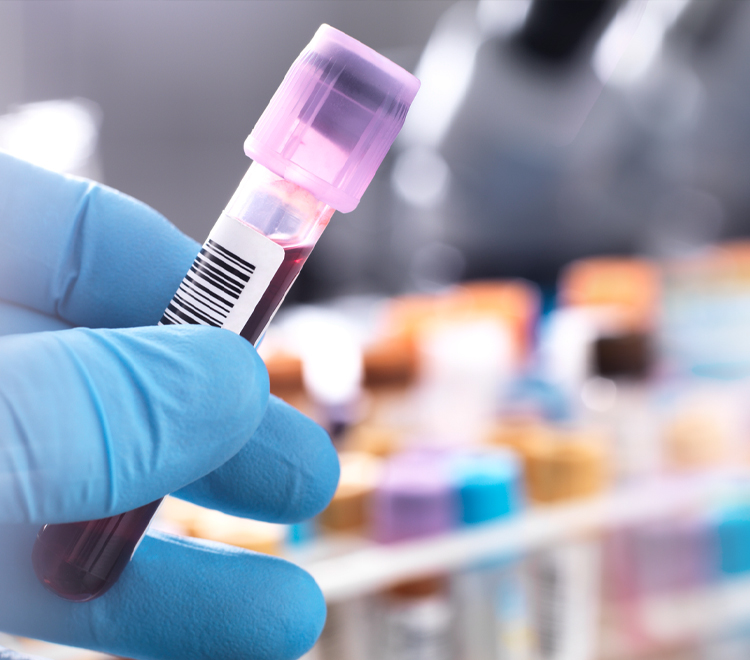
Shield™ Test Information for Clinicians
Your Guide to Blood-Based Colorectal Cancer Screening
The following educational resources are intended to help you become familiar with the clinical evidence supporting the efficacy and safety of Shield, a blood-based screening test for colorectal cancer.

The ECLIPSE Study, Published in The New England Journal of Medicine
Access the PublicationAdditional Resources:
The following educational resources are intended to help you learn more about colorectal cancer screening.
GUT: Patient Adherence
Coronado, et al, 2024
Blood-based colorectal cancer screening in an integrated health system: a randomised trial of patient adherenceParticipants were 2.4 times more likely to complete CRC screening when offered a blood-based test as an option.1
PLOS ONE: Patient & Provider Perception
Schneider, et al, 2024
“I was screaming hallelujah”: Patient and provider perceptions of blood-based testing for colorectal cancer screeningPatient and providers were enthusiastic about blood-based CRC screening test.
Full PublicationJournal of Medical Economics: CAN-SCREEN
Shaun P. Forbes, William M. Grady, et al, 2024
Population health outcomes of blood-based screening for colorectal cancer in comparison to current screening modalities: insights from a discrete-event simulation model incorporating longitudinal adherenceLongitudinal adherence modeling reveals differences in the relative ordering of health outcomes and resource utilization.
Full PublicationOpinion Editorial: A New Era
Samir Gupta, MD
Let's Enter a New Era of Options for Colorectal Cancer Screening"The stakes are high, as the panel recommendation is poised to influence the ability of 50 million eligible adults to gain a new screening option..."
Full Opinion EditorialACG Poster: Adherence Data
Victoria Raymond, et al, 2023
Implementation of Blood-Baesd Colorectal Cancer (CRC) Screening: Real-World Clinical ExperienceReal-world Implementation of this blood-based CRC screening test in 10,000 patients yields an adherence rate (96%) that exceeds rates with existing options (<67%).
ACG Presentation: 1 Year Follow-Up
Daniel C. Chung, et al, 2024
Evaluating the Risk of Non-Colorectal Cancers in Individuals with. a False Positive Blood-based Colorectal Cancer Screening TestIn 600+ individuals evaluated in the ECLIPSE study, a "false positive" Shield test does not appear to correlate with an increased risk for non-colorectal malignancy at 1 year follow-up.
Full PresentationFDA: Advisory Committee for Shield
View the slides presented to the FDA Advisory Committee, resulting in the strong recommendation for the approval of Shield, our blood test for colorectal cancer screening as a primary non-invasive screening option.
Frequently Asked Questions
We’ve put together these helpful educational resources regarding Shield
and its clinical backing.
Patients with a positive result may have colorectal cancer or advanced adenomas should be followed by colonoscopy. The Shield blood test can be considered in a manner similar to guideline-recommended non-invasive CRC screening modalities and is not a replacement for diagnostic colonoscopy or for surveillance colonoscopy for high-risk individuals. This is no different than what healthcare clinicians are currently doing with stool-based tests.2
The Shield test demonstrates an overall sensitivity of 81.5% for detecting curable stage I through III colorectal cancers. Specifically, the sensitivity for stage I is 54.5% (or 64.7% for fully AJCC staged cancers), while Shield achieves 100% sensitivity for stages II-IV. These numbers are in range with other guideline-recommended noninvasive CRC screening options.4,5,6
The Shield test has been assessed by ECLIPSE, which validated its performance as a highly sensitive blood test for CRC screening, demonstrating 83% sensitivity for CRC at 90% specificity, and 13% sensitivity for detecting advanced precancerous polyps.4
In cases of a positive Shield test result with a negative colonoscopy, further CRC screening recommendations should be guided by the colonoscopy findings and should continue participating in CRC screening progams.2,3
Shield is contraindicated for use in patients who have a personal history of adenomas.2,3
We’d be happy to keep you updated on the latest developments. Please sign up to stay up to date or visit ShieldCancerScreen.com for updates.
Have More Questions?
Important Product Information
Intended Use
The Shield™ test is a qualitative, in vitro diagnostic test intended to detect colorectal cancer derived alterations in cell-free DNA from blood collected in the Guardant Shield Blood Collection Kit.
Shield is indicated for colorectal cancer screening in individuals at average risk for the disease, age 45 years or older. Patients with a positive result should be followed by colonoscopy. Shield is not a replacement for diagnostic colonoscopy or for surveillance colonoscopy in high-risk individuals. This test is performed at Guardant Health, Inc.
Precaution: Based on data from clinical studies, Shield has limited detection (55%-65%) of Stage I colorectal cancer and does not detect 87% of precancerous lesions. One out of 10 patients with a negative Shield result may have a precancer that would have been detected by a screening colonoscopy. Shield demonstrated high detection of Stage II, III, and IV colorectal cancer.
Limitations and Other Important Information: The Shield test is not indicated for patients that have personal history of colorectal cancer, adenomas, or other related cancers; or those who had a positive result on another colorectal cancer screening method within the last six months, have been diagnosed with a condition associated with high risk for colorectal cancer such as Inflammatory Bowel Disease (IBD), chronic ulcerative colitis (CUC), Crohn’s disease; or who have a family history of colorectal cancer, or certain hereditary syndromes. Providers should discuss the most appropriate screening test to use with patients depending on their medical history and individual circumstances. Shield may produce a false negative or false positive result. A false negative result may occur when the Shield test does not detect a colorectal tumor signal while a colonoscopy identifies a colorectal cancer. A negative result does not guarantee the absence of colorectal cancer or advanced adenoma, and patients should continue participating in colorectal cancer screening programs at the appropriate guideline-recommended intervals. A false positive result may occur when the Shield test generates a positive result while a colonoscopy will not find colorectal cancer or advanced adenoma.
Please read our provider brochure for complete product information about the Shield test including full safety information.